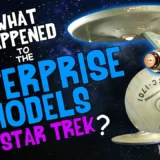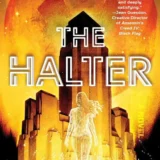
Fanzines reviewed: ANSIBLE (#331), IT GOES ON THE SHELF (#36), and PROBE (#162).
(Please note: Zine reviews are prepared a week or more in advance of publication of this column and may not necessarily include the latest issue available, but the link to multiple issues given at the bottom of each review probably does.)

Ansible (#162) – February 2015 – Find it here
Faned: David Langford British Newszine.
David has been publishing Ansible more or less monthly since August 1979. There was a four year gap between #50 in September 1987 and #51 in October 1981, but ever since it’s been completely reliable in production .
Without a doubt Ansible is one of the best known and most widely read fanzines in the world. Everybody respects and enjoys Ansible. Yet it is only a single two-page sheet. What is the secret of its success? Why do people like it?
Well, for one thing, it’s easily digestible. Doesn’t take long to read so it’s not a huge demand on your time. Yet it contains so much information it is always a veritable snapshot of (mostly) British fandom in recent action. It covers many of the basics.
For instance, media news, publishing news, lists of awards, upcoming conventions and distressingly large numbers of genre obituaries both pro and fannish.
Sound like a shopping list of useful but dull information? Some of it is a bit like that (concentrated and condensed because of lack of space perhaps) but it is David’s delightful approach to his material which keeps his readers addicted. He has an eye for the quirky, the weird, and the off-the-wall. What he comes up with is downright amusing and sometimes astonishing.
A good example is the recent comment by George Lucas he quotes “I really have no interest in science fiction at all.” Or reporting Norman Spinrad “has only just learned that an asteroid discovered in 2004 has been named for him: 186835 Normanspinrad.”
Even better, his regular “As Others See Us” column quoting pretentious views on SF&F by outside critics. Here’s a great example: “I’m not suggesting one can’t fully enjoy… Robert Heinlein, Philip K. Dick, and Orson Scott Card, but I’m not sure one can love them in the way that one loves Shakespeare, Keats, Chekov and Joyce.”
And perhaps most beloved by his readers, “Thog’s Master Class” wherein he quotes examples of less than stellar writing, such as “Her eyes were a rich, dark green, like a pair of verdantly forested planets.”
Ansible worth reading? – For needful information? Yes, a good source. But of far greater value to the reader is the hilarious information, the bizarre and mind-boggling information David so often provides. The dirty little secret to the success of this newszine is that it is wonderfully entertaining. Something all Faneds should think about no matter what they publish.
I note that Ansible seldom has room for locs, so nothing by Lloyd Penney this issue. On the other hand, delightful cover by Brad foster who tends to illustrate almost every issue, which adds to its attractiveness.
( Multiple issues of Ansible here ) & ( Ansible home page here )

IT GOES ON THE SHELF (#36) – November 2014 – Find it here
Faned: Ned Brooks. American Reviewzine.
This is a classic example of a faned selecting a particular subset of zinedom and making it his trademark contribution. Ned likes to read. In this zine he reviews what he reads. That’s it.
From a faned’s point of view this is really quite clever. He avoids the stress of wondering what topic to pursue next. All he needs do is note the comment hooks inevitably popping up in what he reads, and react accordingly with mini-opinion piece commentary. Thus he tackles a wide variety of topics of his own choosing without falling into any sort of expectations trap set by his readers.
Of course, the topic in question might not be of interest. No matter. Move on to the next review. This issue features more than sixty book reviews. If you can’t find anything of interest among them you probably shouldn’t bother reading anything at all. Ever.
I personally zeroed in on his review of “H.P. Lovecraft in the Merrimack Valley” (David Goudsward, Hippocampus Press, 2013). Talk about specialized monographs! 192 pages devoted to a mere portion of Lovecraft’s circle of Correspondence buddies, namely the bunch dwelling in the Haverhill Massachusetts region circa 1921 to 1936. Well illustrated with photographs too. I understand Hippocampus publishes a lot of stuff like that. Kudos to Ned for bringing this to my attention.
On the other hand I was disappointed to learn that “The Coming of The Flowers” (A.W. Anderson) is “not, alas, a fantasy but an explanation of why there are flowers everywhere.”
To my mind an absolute must read would be “Criswell’s Predictions” (J.K. Criswell of ‘Plan Nine From Outer Space’ fame, Droke 1972). To quote Ned: “These are ‘forbidden predictions’ for 1975-2000 based on a face-to-face interview with Nostradamus and on Tarot cards. Utter swill, of course… Nostradamus’ “final words” have it that Portugal will be a central power at the end of the 20th century because it controls the Papacy…”
Ned’s reviews tend to be concise, and sometimes merciless. Take “The Gods Have Landed” (edited by James R. Lewis, SUNY 1995). Ned writes “An anthology published by the State University of New York and subtitled ‘New Religions from Other Worlds.’ Very stuffy and academic – with no mention of Other Worlds, The Gods of Mars, or H. P. Lovecraft. And yet I
suspect that all such modern religions were inspired by science-fiction.”
It Goes On The Shelf worth reading? – The most wonderful aspect of “It Goes On The Shelf” is that it brings to your attention publications and topics you may not have been previously aware of. A great zine for broadening your mental horizons (providing you’re willing to shell out the time and money to track down the nifty books he’s talking about). But even merely perusing his reviews is an education in itself. A delightfully old-fashioned literary exercise.
Nifty cover art by Brad Foster too. Ned received about 45 locs, including one from Lloyd Penney, for which he only has space to quote a single line or two. I, for one, would enjoy reading all the locs in full, but that would probably make this issue way too big to email. Perhaps as a separate, companion loczine? I’d go for that. I offer it as a suggestion.
( Multiple issues of It Goes On The Shelf here )

Probe (#162) – December 2014 – Find it here
Faned: Gail Jamieson. South African Clubzine.
The BC SF Association (which I first joined in March 1971 and currently serve as President and Archivist) used to trade our clubzine BCSFAzine for Probe donkey’s ages ago. We have a mere 18 issues on hand in our archive, however, as financial considerations forced us to cut back on trades. I haven’t seen an issue of Probe in nearly twenty years. Good to know it is still around.
Probe is published on behalf of Science Fiction South Africa (SFSA – sometimes referred to as SFFSA, i.e. Science Fiction Fantasy South Africa) which was founded on 6th June 1969 (about seven months before BCSFA was formed).
A short article reviews the minutes of the first year’s meetings. We learn that the three finalist contenders for the Newsletter title were “Probe,” “Nucleus,” and “War of the Words” with the vote result being 19, 17, and 12. Even more interesting perhaps, the proposed titles which didn’t make it to the final ballot, including “Radiations,” “Contraterrene,” “Avalon Expanding,” “Sci-Lens,” “Marytex,” “Mutations,” “Beep,” “The Waiting Room,” “Entroprian,” and “Pulsations.” I kinda like “Entroprian” myself, but “Probe” is a good choice.
From the very beginning the club was fond of printing member fiction, usually as part of an annual (?) contest titled “Nova.” This issue contains the three General Finalists short stories. Haven’t had time to read them (Amazing’s deadline only two hours away) but the great thing about such a contest is the club camaraderie raised and the sense of accomplishment for each participant. It can be part of the glue which binds the club together.
In addition, three short-shorts are printed. They are very reminiscent of the group stories we BCSFAns used to compose at meetings back in the 1970s. I remember William Gibson always composed the best lines (he’s become a somewhat famous author since, to put it mildly). Basically people just took turns sitting down at the typewriter and bashing out a line or two, or maybe a paragraph. Quality tended to suffer as beer stocks went down.
What SFSA does is a wee bit more organized. Several teams are invited to compose a 99 word story around a specific line, in this instance “Under the purple fog of a winter dawn” which must be completed in 45 minutes or less. The resulting short-shorts are a lot of fun to read. This writing game is called “Wormhole,” which also happens to be the title given to every story. Apparently this event occurs at every monthly meeting. I think it is a splendid idea, well worth other clubs emulating. I also think a bottle or two of beer per contributor would not go amiss. Inspiration, you know? (Well, it worked for us back in the day…)
Another nifty item is an account of a club dinner with visiting Fantasy author Raymond E. Feist who “confided that he had been a writer of humorous short stories, but after losing his fulltime
job, was challenged to do a serious novel. The challenge was by a publisher, who, on condition that Feist worked on it for 12 hours a day, 6 days a week, would cover his rent and food! And publish! (Nice arrangement if you can get it!)”
Feist is perhaps best known for his novel “Magician” which was the final result of the publisher’s generous offer.
Probe worth reading? – Yes! A very solid clubzine. One gets the impression the club members are quite active and enthusiastic. They seem to know how to have fun, which is very important for keeping a club alive. The quality of their writing reflects their success as a club.
( Multiple issues of Probe here )
BY THE WAY:
I apologise for reviewing only three zines. I normally review at least four, and prefer to review five, but it is 3:00 AM the day this is to be published, and I’m about ready to collapse. In fact, I think I will collapse… into bed once I send this off to Editor Steve.
The whole week was messed up, including not contributing a Clubhouse column last Friday, due to frantic juggling of writing tasks because of impending selection for jury duty. Turns out I wasn’t selected. Hope to get back on track fanac-wise soonest.
You can find a fantastic collection of zines at: Efanzines
You can find yet more zines at: Fanac Fan History Project
You can find a quite good selection of Canadian zines at: Canadian SF Fanzine Archive









